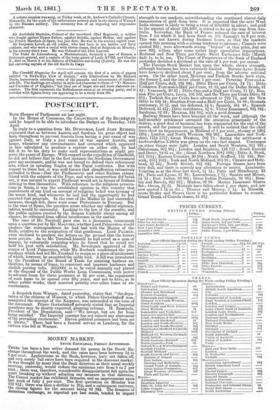POSTSCRIPT.
BOTH Houses of Parliament sat last night. In the House of Commons, the CHANCELLOR of the Excncrotrrat said he hoped to be able to introduce the Budget on Thursday, 11th April. In reply to a question from Mr. DUNCOMME, Lord JOHN Russzrz explained that as between Austria and Sardinia his great object had been throughout to prevent Austria from having a just cause of war
against Italy, or Italy .a just cause of war against Austria, and hence, whenever any circumstances had occurred which appeared
to him calculated to produce a rupture on either side,. he had felt it to be his duty to make such representations as might pre- serve the peace of Europe. With respect to the expedition of Garibaldi, he did not believe that in the first instance the Sardinian Government gave any assistance, and he was not bound to defend their subsequent acts, either in invading Naples or the Papal territories. But with respect to these last, it was well known that dissaffection extensively prevailed in them—that the Piedmontese and other Italians sympa- thized with the subjects of the Pope, and when insurrection did break out, it was natural to expect Piedmont would act in favour of Italians striving to free themselves. With reference to the religious persecu- tions in Spain, it was the established opinion in this country that punishment of any kind on account of religious belief was tyranny of the worst kind,. and whenever he had had the opportunity he had asserted that principle. In the case of the Madiai he had succeeded, because, though few, there were some Protestants in Tuscany. But in the case of Spain, the question arose whether any official represen- tatives would be successful. Looking to the law of the country, and the public opinion created by the Roman Catholic clergy among all classes, he refrained from official interference in the matter. The case of Mr. Turnbull gave rise to a discussion, consequent upon a question put by Mr. Mloranz, whether Lord Palmerston would produce the correspondence he had had with the Master of the Rolls, relative to the resignation of that gentleman. Lord PALXER- sTos declined to produce the letters on the ground that the letters were private. As to Mr. Turnbull himself he had acted as a man of honour, by voluntarily resigning when he found that he could not hold his post with satisfaction. Mr. Newdegate approved of the course of Lord Palmerston, while Mr. Roebuck condemned the pro- ceedings which had led Mr. Turnbull to resign as a piece of intolerance of which, however, he acquitted the noble lord. A bill was introduced by the President of the Board of Trade for assisting harbour au- thorities, by means of loans, to construct and improve harbours and. abolish passmg tolls. 360,000/. is to be voted annually and placed
at the disposal of the Public Works Loan Commission, with power to advance loans for these purposes at 31 per cent., the repayment of such loans to be spread over fifty years, and not to have, as in other public works, their asserted priority over other loans or en- cumbrances.






























 Previous page
Previous page